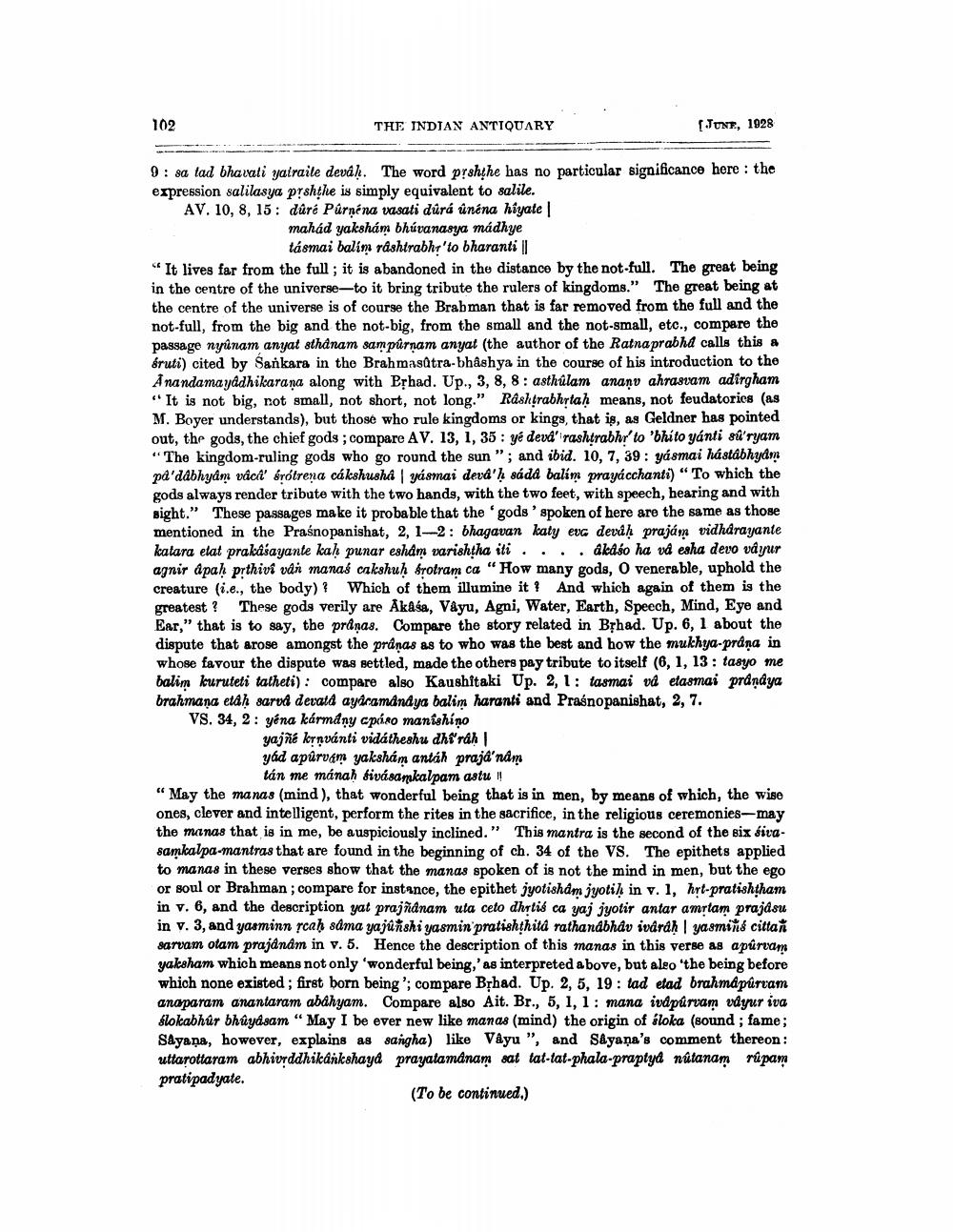________________
102
THE INDIAN ANTIQUARY
(JONE, 1928
9 : sa tad bhavati yatraile devah. The word prshthe has no particular significance here: the expression salilasya prshthe is simply equivalent to salile. AV. 10, 8, 15: duré Půrnéna vasati dûrá únena hiyate
mahad yakshám bhuvanasya madhye
tásmai balím rashtrabhr'to bharanti || " It lives far from the full; it is abandoned in the distance by the not-full. The great being in the centre of the universe-to it bring tribute the rulers of kingdoms." The great being at the centre of the universe is of course the Brabman that is far removed from the full and the not-full, from the big and the not-big, from the small and the not-small, etc., compare the passage nyinam anyat sthanam sampúrnam anyat (the author of the Ratna prabhd calls this a śruti) cited by Sankara in the Brahmastra-bhashya in the course of his introduction to the Anandamayadhikarana along with Erhad. Up., 3, 8, 8: asthulam ananv ahrasvam adirgham "It is not big, not small, not short, not long." Rashtrabhrtah means, not feudatories (as M. Boyer understands), but those who rule kingdoms or kings, that is, as Geldner has pointed out, the gods, the chief gods; compare AV. 13, 1, 35 : yé devd' rashtrabhr' to 'bhíto yánti sú'ryam "The kingdom-ruling gods who go round the sun"; and ibid. 10, 7, 39: yásmai hástábhyam pa'dabhyam vdet' brotrena cákshusha | yásmai deva'h sáda balím prayácchanti) "To which the gods always render tribute with the two hands, with the two feet, with speech, hearing and with sight." These passages make it probable that the gods' spoken of here are the same as those mentioned in the Praśnopanishat, 2, 1-2: bhagavan katy eva devah prajám vidhdrayante katara etat prakasayante kah punar esham varishtha iti.... Akaso ha vd esha devo vdyur agnir ápah prthiví ván manas cakshuh Srotram ca “How many gods, O venerable, uphold the creature (i.e., the body)? Which of them illumine it? And which again of them is the greatest? These gode verily are Akasa, Váyu, Agni, Water, Earth, Speech, Mind, Eye and Ear," that is to say, the pranas. Compare the story related in Bhad. Up. 6, 1 about the dispute that arose amongst the pranas as to who was the best and how the mukhya-pråņa in whose favour the dispute was settled, made the others pay tribute to itself (6, 1, 13 : tasyo me balin kuruteti tatheti): compare also Kaushitaki Up. 2, 1: tasmai vd etasmai pranaya brahmana etah sarvd devald ayacamana ya balim haranti and Praśnopanishat, 2, 7. VS. 34, 2: yéna kármdny cpéro manishiņo
yajñé krnvánti vidátheshu dhi'rah yád a purvam yaksham antáh prajá'ndm
tán me mánah divásamkalpam astu! "May the manas (mind), that wonderful being that is in men, by means of which, the wise ones, clever and intelligent, perform the rites in the sacrifice, in the religious ceremonies--may the manas that is in me, be auspiciously inclined." This mantra is the second of the six fiva. samkalpa-mantras that are found in the beginning of ch. 34 of the VS. The epithets applied to manas in these verses show that the manas spoken of is not the mind in men, but the ego or soul or Brahman; compare for instance, the epithet jyotishdm jyotih in v. 1, hrt-pratishtham in v. 6, and the description yat prajñanam uta ceto dhrtiś ca yaj jyotir antar amrtam prajasu in v. 3, and yasminn rcah sdma yajúñshi yasmin pratishthita rathandbhdv ivärah yasminé cittai sarvam otam prajdnam in v. 5. Hence the description of this manas in this verse as apúrvan yaksham which means not only 'wonderful being, 'as interpreted above, but aleo 'the being before which none existed ; first born being '; compare Brhad. Up. 2, 5, 19 : tad etad brahmapúrram anaparam anantaram abahyam. Compare also Ait. Br., 5, 1, 1: mana ivdpůrvam vayur iva slokabhúr bhûydsam “May I be ever new like manas (mind) the origin of bloka (sound; fame; Sayaņa, however, explains as sangha) like Vayu ”, and Sayana's comment thereon: uttarottaram abhivrddhikankshaya prayatamanam sat tat-tat-phala-praptyd nútanam rupam pratipadyate.
(To be continued.)




